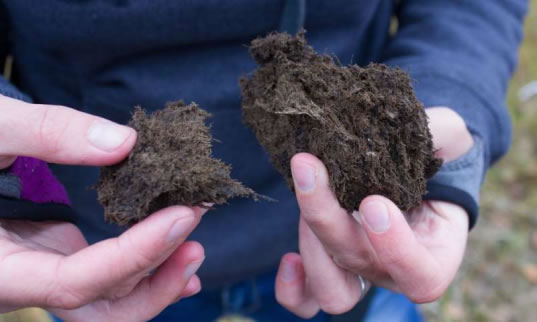Russia synthesizes new biomass fuel
Pyrolysis is a process of biomass decomposition and can proceed spontaneously. Specifically, the biomass is heated to a certain temperature until the process proceeds in a self-heating mode due to its own heat release. Scientists at Tomsk University of Technology reported on the technology in an article published in "Journal of Thermal Analysis and Calorimetry". The development of this technology will make biofuel energy production resources more efficient and more viable.
Scientists have reported the results of studies on such biomass, such as pine wood chips, wood chips, straw and two peat deposits in the Arkadievsky and Sukhovskoe deposits in Tomsk region. They are the most common types of biomass in the region and are typical of biomass throughout Russia. In order to generate heat and energy, TPU scientists pyrolyzed these biomasses, that is, the process of thermally decomposing organic substances in an oxygen-free environment.

The picture shows the Arkadievsky peat in Tomsk Oblast, Siberia, Russia. Image source: Tomsk University of Technology
Worldwide, there are a large number of organic substances that can be used as biofuels. This fuel is more environmentally friendly than traditional fuels. However, co-author Roman Tabakaev, a researcher at Butakov Research Center, said: "In order to replace or simply compete with fossil organic raw materials, the production of biomass fuels should be made more feasible."
One method of generating heat from biomass is pyrolysis. Pyrolysis is the basis of many modern technologies. Although pyrolysis has been around for a long time, scientists do not agree on whether the technology is energy-efficient; some people think it is an unprofitable and wasteful technology because it requires energy to break down organic matter. Research conducted by TPU researchers has shown that the heat released by thermal interpretation is sufficient to maintain the process itself.
During the self-heating process, the reaction temperature is maintained by its own heat release. In fact, it reduces the cost of the process and improves the processing efficiency. The self-heating state is a process in which the magnitude of the thermal effect exceeds the thermal cost. In other words, when the biomass decomposes, it should release more heat than it needs to heat it. In order to determine the values ​​of these indicators-the thermal effects and thermal costs of specific biomass types, the authors performed thermogravimetric analysis (TGA) and differential thermal analysis, and conducted experimental processing of laboratory biological samples.
"Experimental and analytical data obtained indicate that during the pyrolysis of straw, debris, sawdust and peat in the Sukhovskoy deposit, the heat released exceeds the heat required for heating. For peat from the Arkadievsky deposit, the thermal effect is lower than the heating Cost, "Roman Tabakaev said.
This effect of straw and wood is related to the decomposition of cellulose, lignin and hemicellulose during pyrolysis. These processes generate additional heat. In the pyrolysis of Sukhovskoy peat, this effect is due to the decomposition of cellulose, humic acid and fulvic acid. Therefore, the difference between the received heat and used heat of the dried straw sample is 654.5 kilojoules / kg (kJ / kg), the chip is 282.0 kJ / kg, the sawdust is 303.6 kJ / kg, and the Sukhovskoy peat is 275.3 kg / kg .
"In the article, calculations show the possibility of organizing this kind of autothermal pyrolysis. This data is confirmed by the results of recent straw physics experiments, which shows that when the straw temperature reaches 365 ° C, it continues to rise without additional Heating up to 430 ° C independently. The current task is to physically pyrolyze under autothermal conditions while continuously supplying raw materials to the reactor, for which we are now creating an experimental device, "the scientist said.
DH Chinese version CCTV IP Camera
CCTV Ip Camera,Hd CCTV Cameras,Mini CCTV Ip Camera,CCTV Ip Camera System
TD Cloud Security Co.Ltd , https://www.cctvcameraexpert.com
